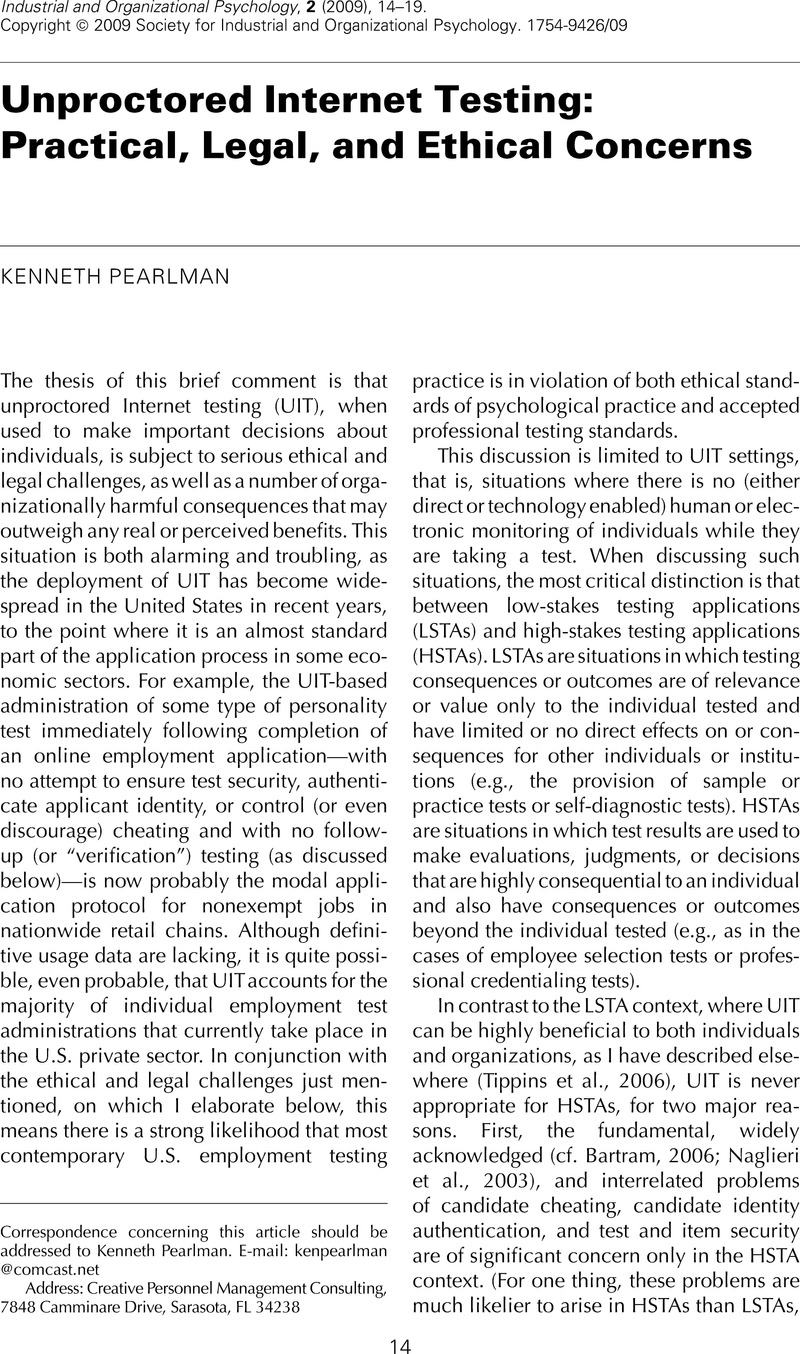Crossref Citations
This article has been cited by the following publications. This list is generated based on data provided by Crossref.
Beaty, James C.
Dawson, Craig R.
Fallaw, Sarah S.
and
Kantrowitz, Tracy M.
2009.
Recovering the Scientist–Practitioner Model: How IOs Should Respond to Unproctored Internet Testing.
Industrial and Organizational Psychology,
Vol. 2,
Issue. 1,
p.
58.
Tippins, Nancy T.
2009.
Where Is the Unproctored Internet Testing Train Headed Now?.
Industrial and Organizational Psychology,
Vol. 2,
Issue. 1,
p.
69.
Reynolds, Douglas H.
Wasko, Laurie E.
Sinar, Evan F.
Raymark, Patrick H.
and
Jones, Joseph A.
2009.
UIT or Not UIT? That Is Not the Only Question.
Industrial and Organizational Psychology,
Vol. 2,
Issue. 1,
p.
52.
Arthur, Winfred
Glaze, Ryan M.
Villado, Anton J.
and
Taylor, Jason E.
2010.
The Magnitude and Extent of Cheating and Response Distortion Effects on Unproctored Internet‐Based Tests of Cognitive Ability and Personality.
International Journal of Selection and Assessment,
Vol. 18,
Issue. 1,
p.
1.
Arthur, Winfred
and
Glaze, Ryan M.
2011.
Technology‐Enhanced Assessment of Talent.
p.
99.
McCloy, Rodney A.
and
Gibby, Robert E.
2011.
Technology‐Enhanced Assessment of Talent.
p.
153.
Beaty, James C.
Nye, Christopher D.
Borneman, Matthew J.
Kantrowitz, Tracy M.
Drasgow, Fritz
and
Grauer, Eyal
2011.
Proctored Versus Unproctored Internet Tests: Are unproctored noncognitive tests as predictive of job performance?.
International Journal of Selection and Assessment,
Vol. 19,
Issue. 1,
p.
1.
Scott, John C.
and
Mead, Alan D.
2011.
Technology‐Enhanced Assessment of Talent.
p.
19.
Makransky, Guido
and
Glas, Cees. A. W.
2011.
Unproctored Internet Test Verification.
Organizational Research Methods,
Vol. 14,
Issue. 4,
p.
608.
Chen, Hsiang-Yang
and
Chuang, Chao-Hua
2012.
The learning effectiveness of nursing students using online testing as an assistant tool: A cluster randomized controlled trial.
Nurse Education Today,
Vol. 32,
Issue. 3,
p.
208.
McPhail, S. Morton
and
Jeanneret, P. Richard
2012.
The Oxford Handbook of Personnel Assessment and Selection.
p.
411.
Sliter, Katherine A.
and
Christiansen, Neil D.
2012.
Effects of Targeted Self-Coaching on Applicant Distortion of Personality Measures.
Journal of Personnel Psychology,
Vol. 11,
Issue. 4,
p.
169.
Scott, John C.
and
Lezotte, Daniel V.
2012.
The Oxford Handbook of Personnel Assessment and Selection.
p.
485.
Tendeiro, Jorge N.
Meijer, Rob R.
Schakel, Lolle
and
Maij-de Meij, Annette M.
2013.
Using Cumulative Sum Statistics to Detect Inconsistencies in Unproctored Internet Testing.
Educational and Psychological Measurement,
Vol. 73,
Issue. 1,
p.
143.
Kantrowitz, Tracy M.
and
Dainis, Amanda M.
2014.
How Secure are Unproctored Pre-Employment Tests? Analysis of Inconsistent Test Scores.
Journal of Business and Psychology,
Vol. 29,
Issue. 4,
p.
605.
Emery, Kara
2014.
So You Want to Do an Online Study: Ethics Considerations and Lessons Learned.
Ethics & Behavior,
Vol. 24,
Issue. 4,
p.
293.
Arthur, Winfred
Doverspike, Dennis
Muñoz, Gonzalo J.
Taylor, Jason E.
and
Carr, Alison E.
2014.
The Use of Mobile Devices in High‐stakes Remotely Delivered Assessments and Testing.
International Journal of Selection and Assessment,
Vol. 22,
Issue. 2,
p.
113.
Wright, Natalie A.
Meade, Adam W.
and
Gutierrez, Sara L.
2014.
Using Invariance to Examine Cheating in Unproctored Ability Tests.
International Journal of Selection and Assessment,
Vol. 22,
Issue. 1,
p.
12.
Tippins, Nancy T.
2015.
Technology and Assessment in Selection.
Annual Review of Organizational Psychology and Organizational Behavior,
Vol. 2,
Issue. 1,
p.
551.
Goffin, Richard
2016.
Encyclopedia of Personality and Individual Differences.
p.
1.



